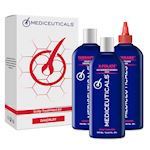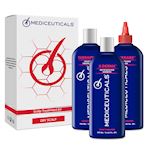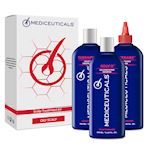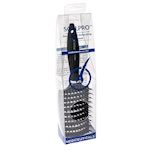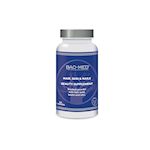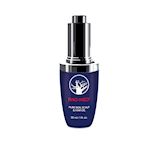-
FLAKES ON THE SCALP
Do you ever suffer from an itchy scalp with flakes? Then you know how annoying that is. Not only is the itching a torment, but the flakes are also no fun. They are especially visible on dark clothing and can quickly look unkempt. What is the cause? Where do those annoying flakes come from? And why is your scalp so itchy?
The answers are not always easy to find. It might be dandruff, but that is certainly not always the case. That is why in this blog we look for the causes of an itchy scalp with flakes. And of course, we also look at how you can get rid of it.
-
HOW DO FLAKES DEVELOP ON THE SCALP?
The appearance of flakes on the scalp is actually a very normal phenomenon. They are old, dead skin cells that peel off over time. This is a continuous process in which the skin renews itself. Normally these flakes are so small that you can hardly see them. If the skin cells on the scalp renew faster than normal, more and especially larger flakes are formed. Sometimes those flakes also clump together. If sebum production on the scalp also increases, more fat will be deposited on the scalp. The flakes clump together even more and you often experience itching as a result thereof.
Flaking on the scalp is also caused by certain yeasts. In addition, the amount of flakes increases if the scalp is very oily or very dry. External factors, such as the care or styling products you use and the humidity, can also have an influence.
WHAT ARE THE CAUSES OF FLAKES ON THE SCALP?
We see an itchy scalp and flakes with various conditions and scalp problems. We list the most important ones below:
Dandruff
When you think of flakes, you probably think of dandruff. Many people confuse dandruff on the scalp with dry scalp. Dandruff can be recognized by yellowish, greasy flakes spread over the entire scalp.
Dry scalp
With a dry scalp, the flakes are white in color, very fine, and loose. If you run your hand through your hair with a dry scalp, the flakes will easily fall onto your clothes.
Seborrheic dermatitis
Are the flakes a yellow or yellow-white color and is the scalp red? Then there is a good chance that you have seborrheic eczema. Especially if the scalp is also itchy and the flakes are also visible on the eyebrows and around the nostrils.
Psoriasis
In psoriasis, the flakes are thicker and white-silver in color. They are usually stuck to the scalp and are therefore not visible on your clothing. The scalp is often very red with psoriasis and you probably also suffer from itching.
Mold or bacteria
A fungus or bacteria can also cause flaking. The fine white flakes are then only on part of the scalp. You may also experience itching in that area and your hair may fall out.
THE TREATMENT OF AN ITCHY SCALP WITH FLAKES
The treatment for an itchy scalp with flakes naturally depends on the cause. Dandruff requires a different treatment than dry scalp or seborrheic eczema. It is therefore important to first determine what exactly is going on. Feel free to visit a Mediceuticals salon for personal advice. They will be happy to tell you which scalp problem you have and which treatment is best suited for it. They will also let you know if it is wise to contact your GP or dermatologist. Use our Salon Finder to find a salon near you.
In the meantime, there are a number of things you can do yourself to reduce flakes and itching:
Use the right shampoo and conditioner
For an itchy scalp with flakes, using the right shampoo is very important. It is even possible that an aggressive shampoo is the cause of the problems. Therefore, choose a shampoo that is suitable for scalp problems. The Scalp Therapies line from Mediceuticals has been specially developed to address the specific cause of the scalp problem. Here you will find shampoos and conditioners for various scalp problems, including dandruff, dry scalp, and irritated scalp.
Do not wash your hair and scalp too hot and remember processing times
With scalp problems, it is important not to wash the hair and scalp too hot. Allow the shampoo and conditioner to work in thoroughly and rinse thoroughly. While washing, massage the scalp to loosen the flakes. It is best to rinse with lukewarm water because too much heat is not a good idea for an itchy scalp. It dries out the scalp further and that only makes the itching worse.
Avoid using heat tools
In addition to water that is too hot when washing, heat tools such as a hairdryer or hair straightener are also not a good idea for an itchy scalp with flakes. Therefore, it is best not to use either for a while. Would you still like to blow-dry your hair? Do not hold the hairdryer too close to your head. Consider blow-drying only the ends of the hair and allowing the top near the scalp to air dry.
Use skin-friendly styling products
The products you put in your hair to style it also have a major impact on the condition of the scalp. Therefore, choose skin-friendly products that are especially suitable for a sensitive scalp. Mediceuticals hair styling products can be used with confidence. They are enriched with natural botanical ingredients, are water soluble, and keep the scalp in good condition.
Stop scratching
We know it's very difficult...don't scratch when you're itching. But it is still wise not to scratch. By scratching you damage the scalp, which only makes the complaints worse. The scalp can even become inflamed. That is of course the last thing you want.
HOW IS THIS GOING TO CONTINUE?
The problem with an itchy scalp with flakes often lies in finding the cause. The cause also determines how easy it is to treat. For example, a dry scalp is easy to treat, while psoriasis and seborrheic dermatitis are more difficult to treat. A lot of improvement is often possible with the special shampoos and conditioners from Mediceuticals. If you have an itchy scalp with flakes, always visit a Mediceuticals salon for personal advice. They are often good at telling you what the cause is.
If a cause cannot be determined, the tips above will hopefully help to alleviate the complaints. Do not expect results within a day, but give your scalp time to recover. Is the situation not improving and you still don't trust it completely? Then contact a doctor or dermatologist to prevent worse.
-
DO YOU WANT MORE INFORMATION ABOUT MEDICEUTICALS?
For personal advice you can contact us or make an appointment at one of our certified Mediceuticals salons.




